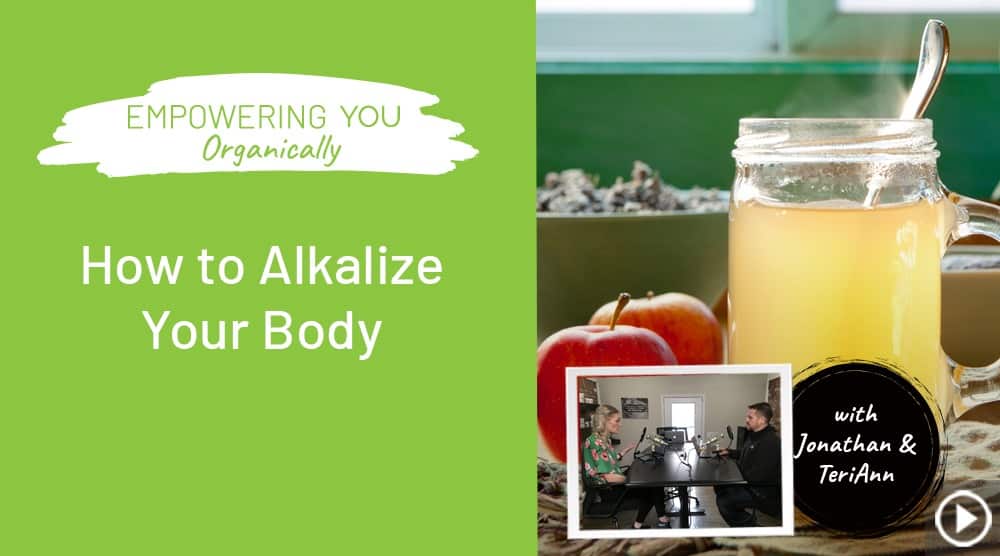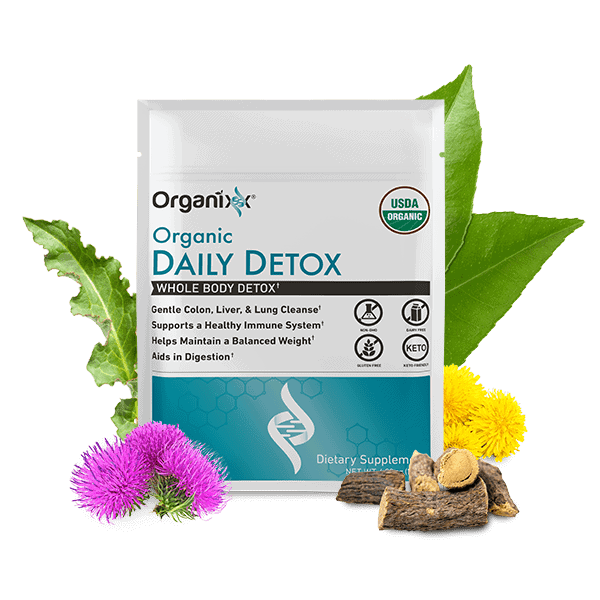Empowering You Organically – Season 11 – Episode 93
Title: How to Alkalize Your Body
Hosts: Jonathan Hunsaker & TeriAnn Trevenen
Guest: None
Description: What is pH balance? Your body’s pH balance, also referred to as its acid-base balance, is the level of acids and bases in your blood at which your body functions best. Tune in to learn which foods help keep you balanced.
* * *
FEATURED PRODUCT
Daily Detox Powder Designed Specifically to Boost Your
Natural Detox Response System Day and Night
- Promotes a strong, robust immune system that protects you all year round.
- Supports healthy liver function. (Your liver is your body’s #1 detoxifier)
- Aids bile production for a strong, predictable digestive system so it can remove larger toxins from your body.
- Supports healthy lungs and their ability to cleanse airborne toxins from your system.
- USDA Organic.
- Boosts energy, promotes regular sleep patterns, and even increases mood so you’re less irritable, more focused, and ready to take on each day.
Importance of Balanced pH in the Body
What is pH balance?
Your body’s pH balance, also referred to as its acid-base balance, is the level of acids and bases in your blood at which your body functions best.
The human body is built to naturally maintain a healthy balance of acidity and alkalinity. The lungs and kidneys play a key role in this process. A normal blood pH level is 7.40 on a scale of 0 to 14, where 0 is the most acidic and 14 is the most basic. This value can vary slightly in either direction.
If the lungs or kidneys are malfunctioning, your blood’s pH level can become imbalanced. Disruption in your acid-base balance can lead to medical conditions known as acidosis and alkalosis. Both conditions require treatment from a medical professional, not simply dietary changes.
Different fluids are found inside the human body. The cells inside the body are often affected by the ph level.
If you experience stress, tiredness, excess weight, fatigue, aches, pains, poor digestion, and other serious disorders, the ph level inside your body may be too acidic.
The three things that might contribute more to the body to become overly acidic are ingesting acids, creation of acids, and improper acid elimination.
Role of pH in Everyday Life
- Digestive system
- Hydrochloric Acid – produced in stomach and helps digestion of food without causing any harm to the stomach. If it gets too high there is pain and irritation in the stomach.
- Acids Cause Tooth Decay
- Sugar is degraded by bacteria in the mouth and acid is formed. When the pH is lower than 5.5 tooth enamel is corroded. Our saliva is slightly alkaline, so it helps neutralize some acid.
- Acid is Produced in Fatigued Muscles
- As a result of physical exercise, stiffness and pain in the muscles starts due to the formation of lactic acid. This reduces the oxygen supply in your muscle.
Foods to Help Balance Your pH
Ingesting foods which are considered acidifying foods as dairy, processed sugar, meat, alcohol, coffee, etc. overloads the ability of your body to neutralize all the acids.
If you want to obtain a well-balanced ph, you must have a proper diet and nutrition. It is wise to follow a detox plan which can greatly help the detox process. A diet consisting of foods high in alkaline, proper supplementation, and hydrating the body properly can aid the body in detox.
Alkaline Veggies to Add to Your Diet
If you have a condition that requires you to watch the alkaline and acid levels of your food, then you will be curious about which alkaline veggies you can add to your diet. Here are some of the best options for you.
Cauliflower
You first vegetable option is probably one you already eat on a regular basis, which is good news! This makes it a lot easier to add to your current diet, and still be on the alkaline diet your doctor recommends.
- This interesting vegetable is highly anti-inflammatory and provides a good amount of choline which is an important B vitamin for brain health.
- It is also an excellent source of antioxidants and phytonutrients which give the body a better chance at fighting free radicals.
- Cauliflower also helps cardiovascular health because of the agent sulforaphane which promotes proper cell formation of the veins and arteries.
- Another excellent thing about cauliflower is that it is often used in low-carb diets, so if this is something you need to watch out for, this is a great low-starch vegetable.
Radishes
Your next option is to add more radishes to your current diet, as they are also very alkaline vegetables. Radishes are known to have a cooling effect on the body, and was used by ancient Chinese doctors to help people deal with heat during hot weather.
- They’re also diuretic and help the body to flush toxins by passing them into urine and out of the body.
- They are high in vitamin C and other trace minerals.
Lettuce
Along with its alkalinity, lettuce provides a lot of the important trace minerals. These include phosphorous, calcium, iron, potassium, sodium, zinc, magnesium, and the vitamins vitamin B6, vitamin K, riboflavin, niacin, folate, Vitamin C, and Vitamin A.
- Studies have also found that lettuce contains chemicals that help to improve mood and can help to regulate anxiety.
- It is so easy to eat more lettuce, making this at the top of the list. You can add lettuce to sandwiches or burgers, make wraps with lettuce, have salads, and even add it to your pasta or casseroles.
Carrot
A high fiber vegetable, carrot is well known for its starchy fibrous body. It is high in pantothenic acid, folate, potassium, iron, copper, and manganese, and has excellent antioxidant properties.
- They have long been associated with the improvement of eyesight, and studies have shown that carrots can prevent some forms of muscular degeneration that are common as humans age.
Green Beans
More than just a staple food for some cultures, green beans are another highly antioxidant and anti-inflammatory food with great health benefits.
- Green beans have been found to be effective at reducing risks associated with heart disease. This is believed to be due to the high number of flavonoids.
- Green beans are also a major source of antioxidants.
- Since many people get green beans in the can, it is best you choose fresh or frozen varieties. If you do need them canned, get the no salt added variety, and give them a good rinse just to be sure you don’t have extra sodium.
Celery
Celery is a heavily fibrous plant that has its roots deep in history as an anti-high blood pressure medicine. It is highly anti-inflammatory and powerful antioxidant properties.
- Celery also contains quite a few trace minerals and vitamins.
- Another amazing effect of celery is its ability to stimulate liver functions. It does this by helping the liver to produce liver cleansing enzymes.
- It can help you to both lower your cholesterol, and to fight microbial infections in the body.
- Celery juice has also become very popular lately. You can get a juicer and use stalks of celery to make juice with celery alone. It has such a high water content, that it won’t take quite as much as other vegetables would for a similar juice.
Here are some of the top alkaline fruits to consider adding to your diet.
Coconut
This hard-shelled fruit is packed with a ton of benefits.
- Coconut has a history of improving skin by aiding elasticity and fighting oxidative stress.
- It is also great for your immune system, because it has a large amount of antiparasitic and antimicrobial properties.
- Coconut can also help to improve digestion of food, and make it easier for the body to absorb valuable nutrients
- One of the best attributes of coconut is that it can even help regulate insulin, which can help to prevent diabetes.
Papaya
Papaya Is a tropical fruit. This fruit is widely known for its ability to aid in calming the stomach and reducing the production of stomach acids.
- This can help to massively improve digestion.
- It’s full of vitamins B, and C and is heavily antioxidant, which fights free radicals that cause cancer.
Bananas
This yellow tree fruit is packed with great carbs and vitamins. Even though it contains a healthy dose of nutrition, it still has less than 120 calories.
- Eating a banana won’t spike your blood sugar, and they are absorbed quickly.
- They are very high in fiber, can help you to have proper elimination, and are very filling. This absorption and high fiber will make you to feel more satisfied and fuller.
- Bananas also have a positive effect on moods and can help you to relax and be able to sleep better.
Avocado
Avocado is among the most popular for use as a condiment, topping, or filling. One thing few people know is that they are higher in potassium than the average banana.
- They are also high in fiber and can help to lower your cholesterol.
- They contain massive amounts of vitamins and minerals that help to nourish the body as well.
- Plus, who doesn’t love avocado? This is an amazing healthy fat that is approved in the majority of diets and can fill you up in between meals.
- It works great in smoothies, to have as a snack, top salads, or add to sandwiches. There are endless ways to use more avocados if you are looking to have more alkaline fruits in your daily diet.
Grapefruit
This larger citrus fruit can help with cholesterol levels, and greatly impacts lipid levels.
- Grapefruit is associated with weight loss because of its effect on fats in the body and is full of vitamins like Vitamin C.
- It can also help to erode build ups of calcium like the calcium found in painful kidney stones.
- It is also popular to use as a late-night snack instead of eating carb filled junk foods.
Lemon
Lemon juice is a great way to stimulate action in the liver because it contains uric acid, which breaks down a number of toxins in the body.
- Lemon is also effective at dissolving kidney stones and can help to improve digestion.
- If you were to consume at least a glass of lemon juice a day, the acids can stimulate your intestines to create a bowel movement, and the juice can help to dissolve various substances that form plaque on the intestinal walls.
- The great thing about lemon is how versatile it is, and how easy it is to have more of it. For example, if you are looking to develop a new daily routine for your health, you can start each day with a full glass of lemon water. Just slice up lemon and add it to a glass, or you can even prepare a pitcher of lemon water the night before, then just pour it in the cup the next morning.
Cherries
Cherries are an amazing natural source of melatonin which is a hormone produced by your pineal gland.
- Science has discovered that eating cherries or drinking cherry juice can greatly help you to stay asleep for longer periods.
- Melatonin is also an antioxidant that can help to combat free radicals.
- Cherries are also full of powerful naturally occurring anti-inflammatory chemicals.
- If you are a fan of smoothies, cherries make a wonderful addition to your favorite recipes. Cherries have just the right amount of sweetness, so you can add just a few of them to your smoothie and it will be sweeter, even if the smoothie is a green smoothie with lots of greens.
***
Subscribe to Empowering You Organically
Never miss an episode!
APPLE PODCASTS SPOTIFY GOOGLE PODCASTS





